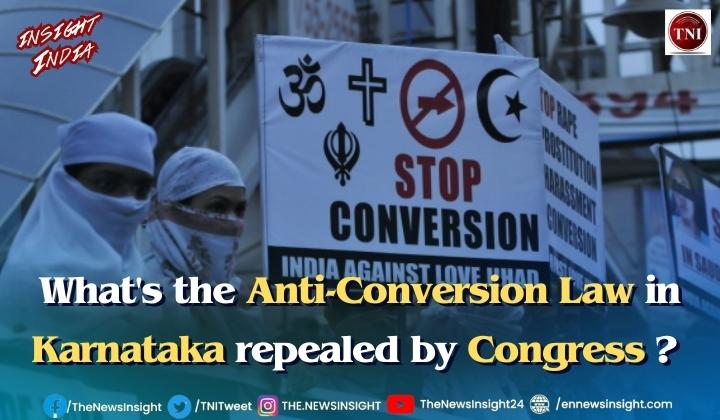Bengaluru, TNI Bureau: The Congress-led administration made the decision on Thursday to repeal the anti-conversion law implemented by the previous BJP government. Additionally, they opted to revert to previous school textbook chapters by removing content related to RSS ideologues K.B. Hedgewar and V.D. Savarkar, which had been introduced by the saffron party.
During the weekly cabinet meeting, it was unanimously agreed to revoke the Karnataka Protection of Right to Freedom of Religion Act, 2022. This legislation imposed severe penalties, including jail terms of up to 10 years and fines of up to Rs 1 lakh for conversions accomplished through coercion or allurement.
Support Independent Journalism? Keep us live.
The anti-conversion law, as it became widely known, created significant barriers for individuals seeking to voluntarily adopt a different faith. Violations of the law were considered cognisable and non-bailable offenses.
Congress Repeals Anti-Conversion Law in Karnataka, what is the law all about?
- Karnataka Act No 25 of 2022, commonly referred to as the bill, adopts a strict stance against religious conversion achieved through deceitful tactics such as misrepresentation, force, fraud, undue influence, coercion, allurement, or through the promise of marriage.
- The legislation imposes limitations on illicit religious conversions, with a specific focus on two commonly reported factors in such cases: the use of inducements and fraudulent methods to compel individuals to change their religion.
- The act defines “allurement” as any form of enticement involving promises of marriage, employment, free education, gifts, gratification, easy money, material benefits in cash or kind, access to a better life, the promotion of one religion over another, or denigration of another religion’s practices, rituals, and ceremonies.
- According to the act, “fraudulent” encompasses any form of impersonation, whether through the use of false names, surnames, religious symbols, or any other means.
- The law renders marriages entered into solely for the purpose of illegal conversion null and void. Offenses under this act are non-bailable and cognizable. Individuals seeking conversion are required to declare their intention before and after conversion to a government representative.
- The legislation also targets institutions involved in religious conversion and mass conversion practices, adopting a similar approach to other state acts. The term “institutions” encompasses legal entities, educational institutions, orphanages, old age homes, hospitals, religious missionaries, non-governmental organizations, and other such organizations. Mass conversion refers to cases where two or more individuals are converted.
- The law draws inspiration from Uttar Pradesh’s anti-conversion law. Offenders can face imprisonment for a minimum of three years, extendable to ten years, along with fines. In regular cases, those found guilty may be sentenced to a three-year jail term, which can be extended to five years. Additionally, a fine of Rs 25,000 is imposed.
- If the offense involves a minor, a person of unsound mind, a woman, or an individual belonging to a scheduled caste or scheduled tribe, the jail term increases to ten years, accompanied by a fine of Rs 50,000.
- In the case of mass conversion, while the punishment remains the same, with a maximum of ten years imprisonment, the fine is raised to Rs 1 lakh. The accused is also required to provide compensation, which can amount to Rs 5 lakh. Repeat offenders under this law will face a minimum jail term of five years and an increased fine of Rs 2 lakh.
- Complaints can be lodged by the converted person, their parents, siblings, or any other blood or non-blood relative. Even a colleague is eligible to file a complaint.


Comments are closed.